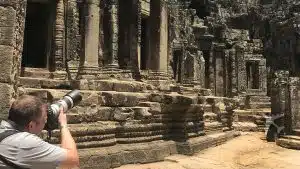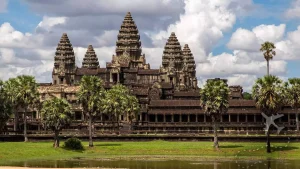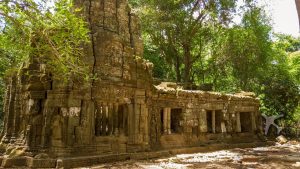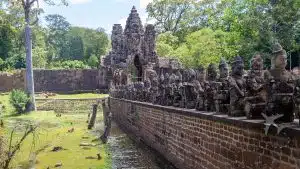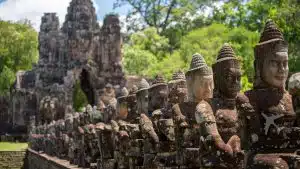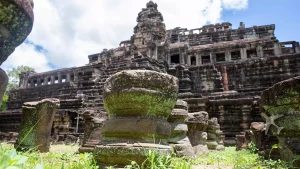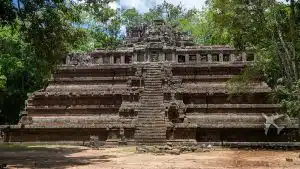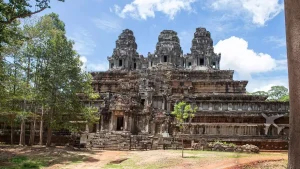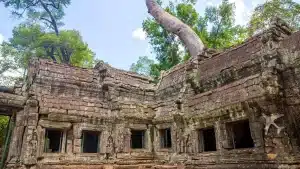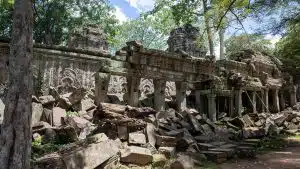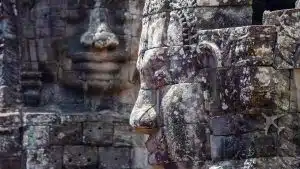Discovering the Ancient Wonder of Angkor Wat
Explore Angkor Wat, an awe-inspiring archaeological site with 1000+ wicked cool Buddhist and Hindu temples from the 9th century.
Angkor Wat Archaeological Park is an expansive complex located northwest of Cambodia, and it’s considered one of the most significant archaeological sites in Southeast Asia. The park spans over 400 square kilometers and contains the remains of several cities that date back to the Khmer Empire, which ruled Cambodia between the 9th and 15th centuries. The centerpiece of the park is Angkor Wat, the largest religious monument in the world, and it’s widely recognized as an architectural masterpiece.
Two million visitors trek to Seim Reap to visit the ruins; The 37 USD entrance fee and impressive tourism numbers have provided a revenue stream to preserve and restore the temples. Sadly, most temples have some level of destruction due to natural disasters, looting, and nature doing nature things.
The park contains several other significant temples and ruins besides Angkor Wat, including Bayon, Ta Prohm, and Banteay Srei. Bayon is known for its iconic stone faces, which adorn the temple’s many towers. Ta Prohm, on the other hand, is famous for the giant trees that have grown around and through the ruins, creating a unique and surreal atmosphere. Banteay Srei is a smaller temple, but its intricate carvings and stunning pink sandstone make it one of the most beautiful structures in the park.
Exploring Angkor Archaeological Park is a unique experience that requires several days to appreciate its beauty and cultural significance truly.
Some of the famous temples and sites in the archaeological park:
- Angkor Thom
- Angkor Wat
- Baksei Chamkrong
- Banteay Kdei
- Banteay Samré
- Banteay Srei
- Baphuon
- the Bayon
- Chau Say Tevoda
- East Baray
- East Mebon
- Kbal Spean
- the Khleangs
- Krol Ko
- Lolei
- Neak Pean
- Phimeanakas
- Phnom Bakheng
- Phnom Krom
- Prasat Ak Yum
- Prasat Kravan
- Preah Khan
- Preah Ko
- Preah Palilay
- Preah Pithu
- Pre Rup
- Spean Thma
- Srah Srang
- Ta Nei
- Ta Prohm
- Ta Som
- Ta Keo
- Terrace of the Elephants
- Terrace of the Leper King
- Thommanon
- West Baray
- West Mebon
Through the viewfinder
Angkor Wat Uncensored
Visitors can hire a guide or rent a bicycle to explore the park independently. A full-day trip visits most of the popular points of interest; However, visitors should plan a multi-day excursion due to the park’s sheer size and ability to appreciate the culture.

It’s not feasible to hike between the temples due to their distance.
The best time to visit is during the dry season, between November and March. Bring lots of water, bug repellant, and sunscreen to avoid the misery of the Cambodian climate. Additionally, the park is less crowded between November and March, giving visitors a better overall experience.
With its incredible architecture, stunning natural surroundings, and rich history, Angkor Archaeological Park is a must-see destination for Cambodia.
Frequently Asked Questions
There is nothing stopping you from walking between temples; however, the distance is not feasible – the park is huge. It is highly recommended to get a private driver / guided tour to optimize your time at in the park.
The typical driver’s fee is USD $10-20 for a full day. Gratuity is appreciated for exceptional service.
Built in the 12th century AD, it was originally a Hindu Temple. It has since converted from Hindu to Buddhist.
Everything you need to know before you visit Angkor Wat
CURRENT WEATHER
overcast clouds
AIR QUALITY
Good
GPS COORDINATIONS
13.4125, 103.8670
HIGH SEASON (MOST EXPENSIVE)
November – March
LOW SEASON (LEAST EXPENSIVE)
April – October
TIME SPENT
6-8 Hours
LOCAL CURRENCY
United States Dollar (USD) or Cambodian riel (KHR)



